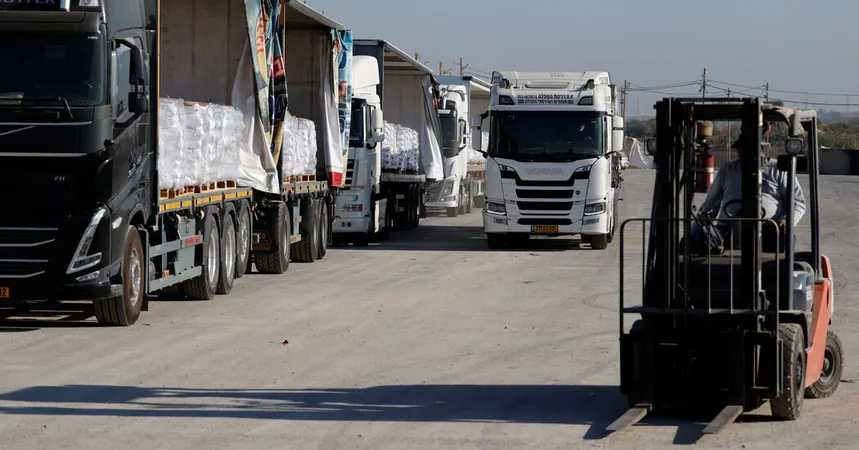
Unprecedented Looting of Aid Convoy in Gaza: A Dire Situation for Residents
2024-11-18
Author: Ling
Unprecedented Looting of Aid Convoy in Gaza: A Dire Situation for Residents
In a harrowing event over the weekend, a large convoy of humanitarian aid trucks was violently looted in the Gaza Strip, marking one of the most severe incidents since the escalation of the ongoing conflict. According to the United Nations Relief and Works Agency for Palestine Refugees in the Near East (UNRWA), the convoy, consisting of 109 trucks, was targeted on Saturday after crossing from the Kerem Shalom border into southern Gaza.
The attackers, who reportedly used firearms to intimidate the truck drivers, forced them to unload vital supplies. Tragically, several drivers sustained injuries, with some even shot during the assault. Out of the original 109 trucks, only 11 reached their intended destination. Louise Wateridge, a spokesperson for UNRWA currently on the ground in Gaza, revealed that the attackers shot out the tires of some trucks to halt their progress and loot the contents.
“This incident underscores the monumental challenges aid workers face in delivering much-needed assistance to Gaza, where desperation has reached alarming levels. People are literally fighting over a bag of flour,” Ms. Wateridge lamented, emphasizing that the humanitarian situation is critical, with a United Nations-backed panel warning of a looming famine impacting the entire region, especially in northern Gaza.
Israeli authorities have repeatedly faced criticism for imposing stringent restrictions on humanitarian aid, leading to a dire shortage of essential supplies. Ms. Wateridge criticized these restrictions, stating, “Everything is being strangled — food, flour, water — we can't facilitate the proper distribution of aid amidst escalating violence and lawlessness.”
While Israeli officials have denied any wrongdoing, asserting that they permit aid deliveries, they have accused Palestinian groups of hijacking this essential support, making it even more challenging for relief organizations. Amidst this chaos, the power vacuum left by the Israeli military's actions against Hamas has allowed for the rapid rise of armed gangs and organized crime, further complicating the delivery of humanitarian assistance.
As of now, Israeli Prime Minister Benjamin Netanyahu has emphasized the necessity of curbing Hamas's capabilities, including their ability to distribute humanitarian aid. He indicated plans for the Israeli military to outline strategies aimed at dismantling Hamas's governing structures. However, this raises pressing questions about who will oversee aid distribution in such a fragmented environment.
With humanitarian convoys facing increasing dangers from looting and armed groups, aid agencies are finding it nearly impossible to track supplies or assess the situation accurately. UNRWA, constrained by Israeli policies that prevent the use of its own trucks, must rely on local contractors, which often complicates logistics and communication during these dire times.
“Currently, our vehicles are fortified as best as possible, reminiscent of something out of a sci-fi movie. We drive fast and try not to stop, hoping to evade any potential attack,” Ms. Wateridge described the precarious situation aid workers find themselves in.
The international community watches closely as conditions in Gaza continue to deteriorate, with urgent calls for a reevaluation of policies that inhibit effective aid delivery. The fate of countless civilians hangs in the balance, and the humanitarian crisis is escalating at an alarming rate.
The clock is ticking, and immediate action is crucial to prevent an even greater catastrophe as the plight of the people of Gaza grows increasingly desperate.




 Brasil (PT)
Brasil (PT)
 Canada (EN)
Canada (EN)
 Chile (ES)
Chile (ES)
 España (ES)
España (ES)
 France (FR)
France (FR)
 Hong Kong (EN)
Hong Kong (EN)
 Italia (IT)
Italia (IT)
 日本 (JA)
日本 (JA)
 Magyarország (HU)
Magyarország (HU)
 Norge (NO)
Norge (NO)
 Polska (PL)
Polska (PL)
 Schweiz (DE)
Schweiz (DE)
 Singapore (EN)
Singapore (EN)
 Sverige (SV)
Sverige (SV)
 Suomi (FI)
Suomi (FI)
 Türkiye (TR)
Türkiye (TR)